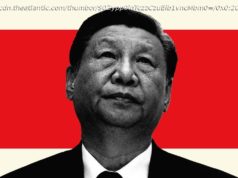The red and yellow standard of the People’s Republic of China is set to rise over Hong Kong Saturday as the city marks two decades of Chinese rule.
While Xi was entertained with a gala event Friday night, elsewhere protest leaders were urging Hong Kongers to have their voices heard in an annual pro-democracy march Saturday afternoon, by which time Xi will have left the city.
Show of force
Xi’s visit, which has seen unprecedented levels of security with roadblocks, huge barriers and a massive police presence, has been largely peaceful.
The Chinese President oversaw a military parade Friday, the largest since the city’s handover from the UK to China in 1997, with around 3,000 members of the People’s Liberation Army taking part.
Multiple attempts by protesters to get anywhere near Xi during his time in the city ended in failure, while a pro-Hong Kong independence rally scheduled for Friday night was canceled after police refused organizers permission to use a public square.
Two dozen activists were arrested Wednesday after they stormed and occupied the public square where the flag-raising took place. The protesters, including „Umbrella Movement“ leaders Joshua Wong and Nathan Law, were not released until early Friday morning.
Pro-democracy activists are now turning their attention to the annual July 1 march, which regularly attracts more than 100,000 participants.
Lawmaker „Longhair“ Leung Kwok-hung dismissed concerns that people wouldn’t come out based on paltry protest numbers earlier this week. He told CNN that thousands attend the march out of a sense of duty and tradition, while others would join to speak out against Xi.
„Have your voices heard, “ Longhair told a small rally late Friday night. „Please come out!“
Protests and challenges
The mood among many pro-democracy campaigners is muted, nothing like the anger and frustration that saw hundreds of thousands occupy the streets of central Hong Kong during 2014’s „Umbrella Movement.“
But deep rifts in society remain, a problem that Chief Executive Carrie Lam, who is set to be sworn-in by Xi in a ceremony Saturday, has vowed to tackle .
Lam has indicated she may revive efforts to pass a controversial anti-sedition law known as Article 23.
Article 23 requires the Hong Kong government to „enact laws on its own to prohibit any act of treason, secession, sedition, subversion against the Central People’s Government.“
Some warn the law could be used as an excuse to crack down on criticism of the government or the discussion of controversial topics like Hong Kong independence.
Many locals fear the law could be the final nail in the coffin for the city’s autonomy from China, granted under the principle of „one country, two systems.“
A previous attempt to introduce the legislation drew half a million protesters onto the streets and resulted in the resignation of a key minister in 2003.
On Friday, Chinese Foreign Ministry spokesman Lu Kang said the Sino-British Joint Declaration, the agreement by which Hong Kong was handed over from the UK to China, was now just an „historical document“ with no practical significance.
Chris Patten, the city’s last British colonial governor, said that China had been pressuring Hong Kong „in all sort of ways.“
„You see this in attacks on the judiciary and the rule of law, interference in court cases, you see it in the atmosphere of hostility toward the independence of universities and the media, “ he told CNN.
At a rally on Friday, practitioners of Falun Gong — a Chinese breathing exercise similar to yoga that is denounced as a cult and banned in China — expressed concern they may be suppressed in the future.
„By the law, we have freedom of speech and freedom of belief, “ Chow Wai-tung said. „We want to tell President Xi to stop persecuting Falun Gong in China.“
Chow said he was worried the situation in Hong Kong was getting worse. „‚One country, two systems‘ is a lie, in a reality it’s just one system, “ he said. „They want the system of China to come to Hong Kong.“






